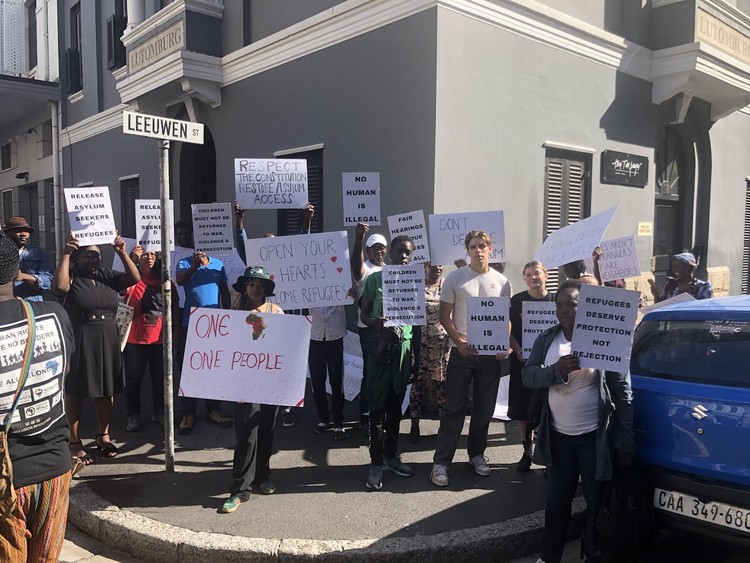Basic education 'on trial' as four get life for killing law enforcement officers
The effectiveness of South Africa’s basic education system came under scrutiny when four young men were handed life sentences for robbing and murdering two law enforcement officers in Cape Town.
Western Cape High Court judge Daniel Thulare said on Wednesday that all four had eventually dropped out of primary school, aged between 17 and 23, without being given the necessary educational support.
“Courts cannot and should not condone ‘good riddance by omission’ when it comes to human beings. No-one belongs in the human waste disposal bin in a progressive society. As it turns out, that human waste disposal bin bred antisocial behaviour and has made the Cape Flats the most dangerous place to raise children, especially boy children” in South Africa.
Ndumiso Lutshetu, Ashwin Kennedy, Bongani Mvamveki and Malibongwe Witbooi were sentenced to 60 years of direct imprisonment.
Law enforcement officers Jan Nieuwenhuys and Simthembile Nyangiwe were in a marked vehicle guarding a construction site at Sweet Home Farms in Samora Machel when they were shot on September 4 2019.
Judge Thulare sentenced Lutshetu, Kennedy, Mvamveki and Witbooi to life imprisonment for each murder charge, and 15 years' direct imprisonment for each count of robbery with aggravating circumstances, illegal possession of firearms and illegal possession of ammunition. Thulare ordered the sentences for the robbery, firearms and ammunition offences to run concurrently with the murder sentences, and declared the men unfit to possess a firearm.
Thulare then turned to the education system. He said the “four accused were dropouts of basic education”.
“Having observed the accused throughout the trial, including listening to them, it is not wrong to conclude that all four were children who struggled with and in traditional educational settings,” read the judgment.
“It seems to me that all four accused were children who faced various learning barriers that hindered their educational progress. Counsel for the accused argued for the court to consider the absence of a proper account from the state, not in the sense of the prosecuting authority, but in the sense of the Republic of South Africa, on how it treated school foundation phase learners who faced learning barriers.
“Counsel for the accused cannot be faulted for urging the court to call out the failure of the state to provide an explanation of its response to barriers that hinder educational progress, especially of young people who end up as perpetrators of serious violent and often fatal crimes.”
Thulare said there was “merit in the observations of counsel that most accused people found guilty of serious violent crimes, especially gang-related violent crimes in the Cape Flats, are foundation phase school dropouts”.
“Most, if not all, including the accused before me, have not passed Grade 7. Courts are left in the dark as to the educational profile, interventions, if any, and the response thereto by the education system,” the judgment reads.
“The time is Tik-Toking towards the need for educators, principals and, if needs be, accounting officers within the department of basic education to come and account for their mitigating interventions, if any, including on cognitive, emotional, social and environmental factors that hindered the educational progress of their learners who ended up as easy targets for recruitment by street gangs.”
He said the men “were simply kept in foundation phase” until they were between 17 and 23 years old. Thulare said they were then “offloaded to the streets”.
“The minister of basic education may be too young to know, but even apartheid basic education issued its learners with the ‘Certificate of Perseverance’ and offloaded them to schools of trade and did vocational training, and not to aimlessly wander the streets with no vocational training explored as an alternative and in extreme cases attention given to children’s processing disorders,” the judgment reads.
“The accused were victims of a cold and non-responsive foundation phase education system, which simply tolerated their difficulties with learning until they dropped out of the system.”
Thulare said the case had shown that “boy-children thrown into a ‘human waste disposal bin’ by a non-responsive basic education system, without any intervention, to the street gangs, have now become not only a danger to society, but actually are bold enough to challenge the authority of the state to such an extent that in broad daylight, they were brazen to disarm the state’s armed forces by killing law enforcement officers to secure firearms to use in their criminal activities.
“The republic’s armed forces were no match for children with learning barriers who were left unattended into adulthood,” the judgment reads. “Being a victim of educational failure is not taken lightly by this court. Nonetheless, it does not justify the inability to differentiate right from wrong or good from bad.
“Those are basic teachings from good parents, educators, blood relations and the community and its structures. People frequently do their hardest to blend in and feel like the people about them rather than thinking for themselves.”
”
Cape Town safety and security MMC JP Smith said, “We are grateful that justice has prevailed, though the loved ones of these officers have waited nearly six years for this moment. It is cold comfort as the sentencing will never right the horrific act of extreme violence that was perpetrated against these officers who were serving the community.”






